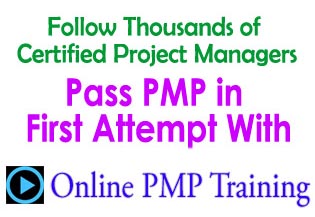“I failed the PMP exam today. It is really unbelievable. I thought I did well on the exam. I was able to finish on time. I have 8 years of project management experience, and have never failed any exam. Yet, I got only one area as Moderately Proficient, and Below Proficient in all other areas. I am really frustrated and shattered. Please help! What should I do now? I really must pass the PMP exam quickly. Please help & guide me…” 🙁
 I get such messages in my email almost every day. Experienced project managers fail the PMP exam routinely, each day… and it is very sad. They take it emotionally and personally… and it is a big blow to their ego.
I get such messages in my email almost every day. Experienced project managers fail the PMP exam routinely, each day… and it is very sad. They take it emotionally and personally… and it is a big blow to their ego.
Let’s analyze why experienced project managers like you could fail the PMP exam? And what can you do to avoid it.
Once you understand the problem, you can cure it. It is better to correct it before you take the PMP exam…. Prevention is always better than Cure…
There are several common traits that I have observed among the people who fail the PMP exam.
1. Over Confidence
Most PMP aspirants are quite confident of their abilities in managing real time projects. Sure, they have successfully managed a few projects, and they think that they have the real experience that is required to pass the PMP exam without any preparation.
Beware. This kind of over confidence in your abilities can cause disaster. The bottleneck often is that success at work does not mean that you know the project management material thoroughly or completely. Not everyone learns or applies all the knowledge consistently on each project. For example, how much time did you spend on your last project planning for quality or planning for risk?
Since many of us do not work on risk, quality or communication proactively, our knowledge is weak in these areas, and in the exam, we don’t have any first hand experience to rely on. Overconfidence in your knowledge is a major potential problem. Make sure you have knowledge and experience in each area. If not, study and practice well to overcome this problem.
2. Lack of Preparation
- Did you prepare well for the PMP exam?
- Did you check the types of questions and how to answer them?
- Did you take up any good mock PMP test?
- Did you spend at least an hour each day for 4-6 weeks, regularly?
- Did you bridge the gap in your blind spots?
If your answer is NO to any of these questions, it may be that your are not adequately prepared for the PMP exam.
Most people give this excuse due to busy work schedules, lack of time, and difficulty in balancing work/life balance. They are working overtime, multiple projects, tight deadlines, and are unable to schedule some quiet study time at home or office. Further, studying at home could be a problem with spouse, kids demanding your time and attention.
This is really no excuse if you are serious about getting the professional qualification. If you do not have the time to study at least an hour a day, you should postpone the PMP credential for a while, rather than give the exam un-prepared, and fail.
I have previously written about the importance of having a good study plan, and you should use it effectively. Check out how to create a Study Plan for the PMP exam preparation.
Take some mock tests to check how well are you prepared. If you are not scoring around 85% marks in the mock tests, you may need to prepare more, or postpone the test until you are ready.
Not familiar with Formal English
Is English your first language?
 If not, chances are that you may not be fluent in American English. Although the language used in the PMP exam is not difficult, and is much like every day used English, many people who come from backgrounds where English is not taught formally in schools, or not your native language, you may take longer to read the question, assimilate it, translate it in your language, then work out the solution, and then translate it back in English to check with the choices. All this takes up valuable time in the exam.
If not, chances are that you may not be fluent in American English. Although the language used in the PMP exam is not difficult, and is much like every day used English, many people who come from backgrounds where English is not taught formally in schools, or not your native language, you may take longer to read the question, assimilate it, translate it in your language, then work out the solution, and then translate it back in English to check with the choices. All this takes up valuable time in the exam.
A number of people fail the exam simply because they take longer to read, re-read the question, and then react. Thus, when the 4 hours finish, they are still on question number 153 or 168. If you are going to leave 30-40 questions un-answered, then only God can help you pass the exam.
Fortunately, there are many ways to remedy this problem. You can practice to read English faster, take a speed reading course online, or do practice to read and react faster. And do as many mock tests as possible to get familiar with the English used in the exam. Most good quality mock tests are quite similar to the PMP exam.
Post in the comments if you need help in finding some good quality PMP mock exam papers.
Scared of Memorization / Formula Questions
Another cause of heart-ache is the fear that our memory will fail. This fear comes from the fact that there are several questions that require calculations using specific formulas used in Time Management, Risk and Cost Management knowledge areas. The formulas are quite similar, and need special care to pick the right formula to arrive at the correct answer. And this becomes a major bottleneck for most PMP aspirants.
The great news is that there is a much simpler way to understand the formulas. Once you understand when to use which formula, and what words to look out for in the PMP exam, it gets much simpler.
Check out some tips on answering Cost questions on the PMP exam, Time management formulas questions, and critical path or float type quetions, or risk management questions regarding contract types.
No Real Experience in Project Management
If your experience is more in doing small projects, support type projects, and limited in scope, you may not have the complete knowledge required to do a large scale project. The breadth of information and experience that comes from doing a large project is really helpful in answering PMP questions. But people with less experience, no real project experience, or doing small project of 1-10 people teams, or short projects of 1-3 months can have a serious disadvantage.
Fortunately, there is a way to think and assume that you are working on a large project. Once you understand what can go wrong on a large project, and what kind of planning is required to achieve it, you can act as if, and assume from the big project perspective. Watch the videos in the PMCHAMP Online PMP Training program to understand this concept better.
Rigid Approach to Project Management
This is a very big problem. Most people fail because they think that their experience is supreme. If it has worked for them in the past, this means that it will always work. They begin to think that their way is the only way. This causes them to answer questions from their own perspective, which may not be correct all the time.
You have to be flexible, and not use a rigid stance. Be ready to embrace other ideas. Be open, and inclusive. Answer questions from PMI’s perspective. Most PMP questions have all 4 correct choices, and you need to choose the BEST approach. This is a skill you can learn. But for this, you need to be open and ready to listen, learn, and then apply them. It will benefit you in the PMP exam, and also in the day to day project management at your work place.
Not using the Right Material for Exam Preparation
If you rely only on the training notes, or pick an older copy of the PMBOK guide, you are in for a serious trouble. You must use the latest, updated books and material. Further, you must undergo a thorough PMP Exam Prep training – either classroom, or online PMP training. The latest PMP exam is based on the Sixth edition of the PMBOK Guide.
You can also get good PMP Exam Preparation books from Amazon. There are several, and I have reviewed a few of the Best PMP Books here on PMChamp Blog.
Further, testing your PMP exam preparation with a good quality PMP Exam Mock Simulator can give you experience of what to expect in the exam, and be ready for the types of PMP questions.
Do get a good understanding of the PMP exam, and watch more interesting insightful videos on the PMChamp Video channel at YouTube.
Conclusion
I always believe in preparing well, and getting it right the first time. Thus, be aware of the pitfalls & get ready to pass the PMP exam in your first attempt. The exam is not difficult. It just tests to check if you have the required experience to act professionally as a project manager on a large project, and will be able to manage a project with all the required per-requisites, and portray a holistic approach. This is the highest test for project managers, and is highly regarded the world over as the ultimate standard. So achieving it is important for your career. Prepare well, do the right things, and take your career to the next level with the PMP certification.
And if you have any questions, do post it in the comments below. I am here to help you.
All the Best – Vinai Prakash



Vinai Prakash,
You have covered entire things, why well experienced Project managers also fails their PMP exam. PMBOK guide concepts and small project manager concepts may differ. So PMP candidate should think broad project management.